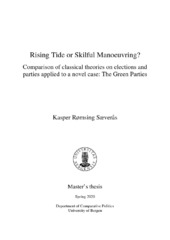| dc.description.abstract | There has been a steadily increasing interest in the study of the phenomenon of “niche” parties in the last decade. The resulting literature has predominantly focused on populist right-wing parties, and while this is vital, the case of the Green party has never been more relevant than today. This thesis examines the rise of Green parties through a rigorous theoretical framework including sociological, strategic and institutionalist theories with a strict case-selection approach. It aims to analyse theoretically different processes addressing why Green parties gain votes in the same empirical model. To this end, a logistic multi-level regression model is applied to data from 14 elections in north-western Europe. The results largely align with theory and current literature: both long-term sociological factors and the more immediate manoeuvring of political parties structure voting behaviour in relation to Green parties. The most significant finding of this thesis is a substantial interaction between how Green parties position themselves relative to the party-system mean at the party level, and post-materialist values at the individual level, in determining the likelihood that individuals will vote for a Green party. On the one hand, the more the Green party separates itself from the party-system mean the less they incentivise individuals to vote for them. On the other hand, in interaction with post-material values at the individual-level the effect is reversed. While concurrent with theory, the greatest implication of this finding is the fact that scholars who wish to analyse the effects of party manoeuvring and the values and attitudes of the electorates in tandem, must be sensitive to the interactions between these levels, especially in the ever more relevant case of the Green parties. | en_US |
